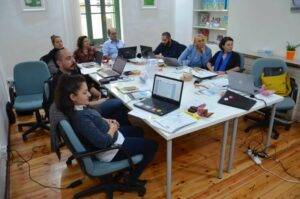LINGUA+
LINGUA+ – a combination of language learning in the host-country and advice on social integration for immigrants
The aim of Lingua+ is to teach immigrants and refugees the language of the host country by connecting the language learning process with a deeper understanding of the economic, cultural and social reality of the host country. The process will combine both accepted methods of language learning, and the general principles of intercultural education, with regards to the cultural and social uniqueness of the two target groups.
The majority of this process will be carried out within foreign communities in Iceland. Until very recently, the country has not experienced any large scale immigration: 10% of the population are immigrants. However, nowadays, the situation has changed dramatically with this percentage continuing to grow. An extraordinary economic growth within Europe has had numerous consequences. On the one hand, qualified workers are leaving Iceland in search of more pleasant places to live, which is contrasted, by the increasing number of immigrants, who are arriving in Iceland with the goal of finding qualified work.
Based on the research of Freire and Don Milani in the late ‘60s, language learning should be made a part of everyday life: whether it’s about family, work, community, culture or leisure, a student’s unique set of experiences should form the basis of any learning experience and outcome. Then empathy comes into play: people converse better when they are being genuine (Rogers 1973) and recognize the other person for who he/she is, without judging them. Learning the language of the host country opens new doors and migrants can do this with more confidence if they feel that their own, plural, identity is recognized.
Consequently , Language learning goals have to be set in a context of cross-cultural adaptation and orientation. This approach becomes even more relevant when addressing the learning needs of illiterate and/or learners who share no common language.
There are two basic aims to this project, which utilise different dimensions of the education process. The Repository of innovations for teaching host country’s language to migrants and refugees will be the result of research carried out by all partners in the project. The aim of the research is to bring together ideas and teaching practices from other countries, which will then be used to help teach migrants and refugees. Academic sources, as well as practical findings coupled with the knowledge of organisations with long-term experience in the field will also be used.
The second goal of the project will be the study of existing practices on the integration of migrants and refugees and the strengthening of empathy through interactions between adults. Again, this outcome will be based on previous experiences of the partnership, and in particular on that of previously theme-related projects. The Study will serve a three-fold purpose: a) expand the partners’ knowledge on the subject; b) provide practical examples that can be adapted to language teaching (e.g.: drama and multi-art forms used as practices in social integration, which can then be adapted to language learning); c) provoke discussion on the distinctive speciality of Lingua+ which is combining language teaching with the host country’s cultural context.
In addition to these two aims, a handbook and a multimedia presentation for those in the language teaching sector (Teacher Training Course Guide and Learning Paths) will be made, explaining how to prepare a learning bloc on a MOOC (Mass Open Online Course). With this outcome achieved, it will be possible to use other tools on MOOC in the future and to replicate them for various purposes.
In the second half of 2018, a series of workshops in partner countries will be held, with the aim of testing new language learning tools, which will both aid the teaching of the host-country’s language and provide foreigners with advice on integrating into the society of the host country. Working versions will then be given to participants for further testing. Any feedback or recommendations gained from these workshops will be invaluable and will help make any further adjustments and changes to the initiative’s aims.
The partnership consists of organisations from Iceland, Great Britain, Italy, Cyprus and the Czech Republic.



